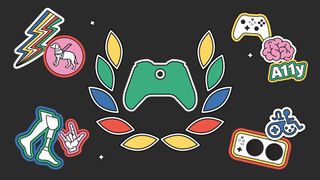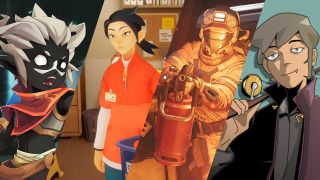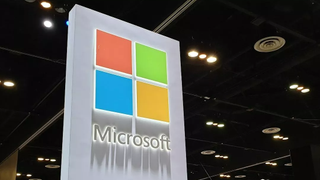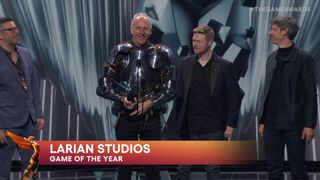Accessibility, sustainability, empathy, and how to build a better games industry
The mood of developers at GDC reflected my own desires for a better 2024.

Lately, it seems there are no shortages of tragedies, controversies, and debacles in the video games industry, not to mention the rest of the world. Each week the ever-online community finds a new hill to set fire to and die on, and each week companies around the globe find new ways to squeeze more profit and less creativity out of the games we're supposed to love. My time with GDC 2024 showed me developers aren't sitting idly by, though; there was a lot of righteous frustration, and a lot of push for positive changes.
Accessibility and inclusivity are both becoming increasingly important for welcoming more players to the community, especially among indie games. Representation for developers in all corners of the globe is giving rise to brand-new gaming experiences we otherwise would've missed out on. The rising environmental cost of the video games industry is finally being combatted by innovation and awareness. Developers are rightfully pushing back against unsustainable, profit-driven trends among mega-corporations and publishers that are actively harming the quality and fun of games.
There's no simple way to solve any of the issues plaguing this industry, but GDC restored a little bit of my hope that the future can still be positive, even as 2024 continues to be hit with mass layoff after mass layoff. I wanted to take a little time to cover some of the biggest topics I saw at GDC, and why I hope they become the themes for video game development in 2024.
Disclaimer
Travel to and from and accommodation at GDC 2024 in San Francisco, California was paid for by Windows Central.
Accessible game design lets more people play

I'm not shy about accessibility; I take every chance I get to advocate for superior accessibility and approachability in all video games, and I celebrate every milestone and achievement in the space. I'm usually the one to highlight Xbox's work in video games accessibility, for example, as I'm a huge fan of the company's effort in recent years. GDC 2024 was a fantastic resource for developers looking to improve their games' accessibility.
My first day at GDC, for example, I attended a summit by Matt MacLean from Generic Lake Monster called “Making Accessible Games with Indie Resources.” You can actually find the summit at the GDC 2024 Vault if you're interested in checking it out (in fact, here are some other accessibility-focused summits in the vault). During the summit, MacLean talked about how indie developers can use their limited resources to make accessible and approachable games, which begins with early intent and reasonable goals.
Before that, though, it's worth stressing that making an accessible and approachable game is always worth it in the long run, as it directly leads to more players being able to enjoy your games and results in less stressful and more streamlined player testing during development. There are millions of players that rely on accessibility options or game design elements to enjoy video games, and simple directions during game development can open your game to many of those players.

MacLean's summit reflected a lot of my own thoughts on accessibility in games. He discussed how thinking about accessibility early makes the entire game development process easier, but starting at any point is better than not at all. He talked about how accessibility isn't just a bunch of technical options and settings, but it's also approachable game design that includes the interface, story pacing, gameplay and controls, and even content opt-outs.
Get the Windows Central Newsletter
All the latest news, reviews, and guides for Windows and Xbox diehards.
As long as you're helping players stay in the flow, a few reasonable accessibility goals can dramatically improve your game. It's impossible to account for every possible pain point that may prevent a player from enjoying your game, but intentional, approachable game design is the first step to great accessibility. You can decide on boundaries for what you believe is possible for your team and game, and then work on achievable and stretch accessibility goals. Test with players, look for easy wins like large fonts and remappable controls, and always be thinking about whether a potential obstacle in your game is really necessary for your vision.
It was a great summit, and he also shared some helpful resources for developers, including the Game Accessibility Guidelines and AbleGamers. I'll also go ahead and add Xbox's accessibility guidelines and development resources there, which can be useful even if you're not developing for Xbox platforms. It wasn't just MacLean's summit, either (or even the other accessibility summits I shared above); GDC 2024's Expo Hall was filled with companies toting new development tools and resources that can help take strain off developers and aid with improving accessibility.
I love to see it, and I'm already seeing titles like Botany Manor push accessibility for indie games. Hopefully, what I saw at GDC 2024 will lead to even more accessible and approachable games in the future.
Representing players and developers matters

People who have never once struggled to find representation in media love to throw a fit about it as a topic (mostly online), but it's important to many millions of people all around the world. In the video games industry, it's not just important to be inclusive of players, but also of developers. GDC 2024 focused on the latter because finding and supporting diverse developers leads to naturally diverse stories and games.
GDC brings developers from across the globe to one place; I met people from South Africa, Canada, all over Europe, and more. There, developers can gather resources and knowledge to help them build better games and bring those games to more players. In fact, I actually spoke to the lead of Xbox's new Global Expansion team about seeking out developers in underrepresented or underserved markets. More diverse talent leads to more creative and diverse games, and that's good for everyone.
Some of the best Xbox games come from these places, like the winner of the Best Independent Game at IGF 2024, Venba, which my colleague Brendan Lowry played and described as one of 2023's hidden gems. There are countless breathtaking, world-shaking, heart-wrenching, or simply wonderful stories out there that often don't get the chance to shine in the spotlight under the unbearable weight of industry goliaths like Call of Duty and Fortnite. Pulling from as many cultures and histories as possible only makes gaming better, and finding those passionate creators only makes games more fun.
NVIDIA's Audio2Face tech was used for the English facial animations in this game.
Of course, player representation matters, too. That doesn't just mean telling diverse stories or creating diverse characters, it also means meeting players where they are. It's accessibility and inclusivity, but it's also localization. Many players may miss out on games they'd otherwise love because it's not available in a language they speak, and modern tools and technology make it easier than ever to cater to those players.
Expert translation and localization done by hand and supported by local voice actors is obviously the ideal, but many smaller developers simply don't have the resources to invest in that level of localization. However, aside from the internet making it simpler to find people to help with translations (and the bevy of amazing members of the community more than happy to bring more games into their language), AI can also be a potent tool.
I wrote extensively about AI in gaming at GDC 2024, and a part of it explores how AI can assist with localization. The above video shows World of Jade Dynasty, an MMORPG that uses NVIDIA's AI tools to animate character faces when speaking in other languages — tailored animations are more believable, but having accurate facial animations for each localized language is better than none. AI in gaming is also becoming more adept at translating text to audio, so that only subtitles need to be fully localized — proper voice acting will always be more impactful and emotional, but having any audible dialogue in your own language is better than none.
That being said, a lot of this is specifically for independent developers. No so-called "AAA" game studio should be looking to cut corners (and quality) in order to save cash. Localization is just as important as accessibility and inclusivity, and deserves as much investment as possible.
Environmental sustainability to combat AI
UnearthU isn't a part of Solar Server, but it is a game made by its creator, Kara Stone, using digitally recycled materials.
The earth is important to me. After all, I live here (and so do you, I assume). Environmental consciousness is becoming increasingly important as the effects of climate change evolve and humans as a whole create more waste, and the video games industry is a huge part of that waste. Many don't think about sustainability when it comes to video games or how it can be improved, but I did hear it discussed at GDC.
One of the most interesting summits I attended included a speaker named Kara Stone, who talked about her personal initiative, Solar Server Games. It's a solar-powered server running on Stone's balcony in Alberta, Canada, designed to host a series of smaller, low-carbon indie games with environmental themes. Stone built the server herself, and it's powered by a Raspberry Pi. It's a fascinating project that puts environmental responsibility on game creators rather than the player, and sacrifices the expectation of constant convenience for sustainability, as the server may become unavailable depending on weather conditions.
Solar Server won't make much difference in the long run, but it's one of many initiatives to educate people and raise awareness about sustainability in video games. Video game development, console and other hardware production and manufacturing, and online services like multiplayer servers and game streaming all contribute to the sustainability nightmare that is this industry. I know I recently discussed some of the potential benefits of AI in gaming, but you can't speak about the pros without acknowledging the drastic impact on the environment AI can have.

Fortunately, many companies are actively investing in sustainability and even pursuing carbon neutrality or carbon negativity, with Microsoft and Xbox being a prime example. Microsoft is manufacturing its own ARM server CPUs for its AI and cloud divisions, which are more efficient than traditional server blades, and is also considering nuclear power to help run its AI endeavors. Xbox also worked with its studios to develop a sustainability tool kit for game developers to use, which helps identify potential energy inefficiencies in games.
Even Xbox consoles have changed over the years to be more sustainable. The Xbox Series X|S are carbon aware and have several options to improve power efficiency, for one. The latest Xbox consoles are more repairable than ever, too, making it easier for anyone to keep their console running for longer instead of replacing it. Even game preservation matters, as Xbox's continued backward compatibility efforts mean your console and all your games will last longer. Xbox even has an entire page dedicated to its sustainability investments.
Sadly, none of this will miraculously reverse the damage done to the environment. After all, capitalism and consumerism caused these problems, and a few eco-conscious companies aren't going to reverse the tide. Still, I'll take every iota of progress we can get in this area, and keep fighting for more. If you want to read a little more on the environmental impacts of video games, here's a great article by Charlie Fletcher at Earth.org, and another from late last year by David Lumb at CNET.
Keeping the industry sustainable for devs

I'll conclude with the topic I saw discussed the most at GDC 2024: sustainability. No, not the sustainability I just covered, but sustainability for the industry itself. Ultimately, GDC is all about networking, where members of the industry can make new connections, seek job opportunities, and hone their skills to be more appealing to job recruiters. It makes sense that the area of the industry most under fire in 2024 would be a hot topic, so to speak.
Burnout, crunch, churn, profit-first game design, poor management, online harassment, and mass layoffs have resulted in a massive pool of talent struggling to maintain a place in the video games industry. Despite video games being as popular as ever, it seems harder than ever to actually find a way to make simply great video games. Creators seem to be sieged on all sides, and GDC was an opportunity to give voice to their struggles. In one way, it was literally about voice.
Yerba Buena Gardens, a beautiful park outside the Moscone Center where GDC is held, has historically been the site of a ton of social activity during the event. This year, it was the gathering place of dozens of developers literally and viscerally screaming their frustrations at an industry that doesn't seem to value them. I saw it myself, but I'm not able to capture the significance of this movement nearly to the same degree as this wonderful article by Giovanni Colantonio at Digital Trends.
“Let’s take a minute where we all stop pretending, and express just how it feels to be a game developer in 2024,” the announcement post for the event, dubbed GDScream, read. Developers are tired of being discarded like they're disposable because of management decisions out of their control, the unreasonable and irresponsible pursuit of ever-increasing profits, and a general unwillingness from companies to simply take care of their employees.

• GDC 2024 overview
• Xbox games & interview
• 10 games with ID@Xbox
• Dune: Awakening preview
• NVIDIA, RTX, & DLSS
• AI innovations in gaming
• Next-gen AR glasses
• Razer Blade 18 hands-on
• Razer Xbox headset hands-on
• Razer Kishi Ultra hands-on
• ThinkPad X1 Carbon review
• Rogue V3 Backpack review
The Independent Games Festival and Game Developers Choice Awards are amazing events that celebrate the most impactful, beautiful, innovative, and creative video games of the year (often in stark comparison to The Game Awards). This year, it was also a platform for people to share their thoughts on the industry, including Larian Studios Swen Vincke. "I've been fighting publishers all my life, and I keep on seeing the same mistakes over and over, and it's always the quarterly profits."
The most prevalent issue afflicting the industry in 2024 is the amount of layoffs we've been seeing. Publishers, especially those who went on a hiring or acquisition spree during the pandemic, are hitting profit walls as a direct result of their impatient greed. This results in these companies unceremoniously laying off a ton of their talent and losing the institutional knowledge they've built up over time. In many cases, those companies have to begin hiring to refill many of those vacated roles in order to keep creating new games anyways.
Riot Games cut 530 staff, or 11% of its workforce. The Embracer Group is one of the most egregious examples, with studio closures like Saints Row developer Volition Studios, canceled games and layoffs like at Deus Ex developer Eidos Montreal, and much more. Microsoft also announced over 1,900 layoffs across Xbox, Bethesda, and Activision Blizzard, despite record profits from the division. This is just a small slice of the layoffs we've seen, and almost all are entirely driven by short-term profit or directly caused by overambitious greed.
In an interview with Game File and beautifully summarized by our siblings at PCGamer, Larian Studios' Director of Publishing Michael Douse said, "None of these companies are at risk of going bankrupt. They're just at risk of pissing off the shareholders... The function of a public company is to create growth for its shareholders... It's not to make a happy climate for the employees."

If you've noticed a trend of Larian Studios, most known now for the critically-acclaimed and award-winning Baldur's Gate 3, being a vocal opponent of the state of the industry, that's for good reason. The company is private rather than publicly traded, and so is not beholden to greedy shareholders chasing exponential growth. Despite this, Larian Studios has enjoyed immense success, and has cultivated a work culture centered around caring for its employees. It's the antithesis to the rest of the industry, and proof that companies can and should be doing better.
I could honestly speak on this topic for much longer, but I'll wrap it up here with a message to video game companies everywhere... Laying off your employees in endless talent-churning loops is not sustainable. Pushing crunch and driving burnout to meet aggressive deadlines is not sustainable. Creating profit-first instead of people-first games is not sustainable. Ignoring your developers in favor of short-sighted management and shareholder decisions is not sustainable. Wondrous things can be accomplished if you have faith in your talent and build games that are fun, engage and include the community, and are built with room for the developers to shine.
Take care of developers and all the amazing people responsible for actually designing, building, and releasing the games that make you money, because I promise that positivity translates into the games themselves and we notice. You want to make money? Slow down and invest carefully in your employees, and stop running studios like they're fast food joints.
Making games better for everyone, everywhere

Every facet of life is endlessly complex, and the nuances only become more fractured the further down you look. It's like the coastline paradox — the smaller the units of measurement you use to define the length of a coast, the longer that coast will seemingly become. The video games industry is no exception. There are innumerable issues, conflicts, and controversies embroiling the industry, and there's no one blanket solution to fix them all or even begin trying. The more specific your answer, the more complications you'll discover.
At GDC 2024, I saw countless developers, speakers, press, and other industry members gather to discuss the current and future state of the video games industry, and the overall mood was a complicated combination of rightful frustration and cautious optimism. Making games more accessible and inclusive for players, getting better at representing and supporting developers and players all over the world, continuing investments in environmental sustainability for video games, and working on solving the myriad of capitalism-related problems afflicting developers were all subjects I saw discussed.
I'm hoping that, moving forward, these are the themes of video games in 2024. I'm so tired of hearing about mass layoffs or discovering the latest horror stories from ex-employees of this publisher or another. I'm also tired of scrolling past the newest, pointless and ill-informed controversy that has gotten a group of very vocal, persistently miserable people online up in arms. I just want to play amazing video games, celebrate those games with my fellow players, and support the developers behind them.
Here's hoping that every step forward from here is better than the last.

Zachary Boddy (They / Them) is a Staff Writer for Windows Central, primarily focused on covering the latest news in tech and gaming, the best Xbox and PC games, and the most interesting Windows and Xbox hardware. They have been gaming and writing for most of their life starting with the original Xbox, and started out as a freelancer for Windows Central and its sister sites in 2019. Now a full-fledged Staff Writer, Zachary has expanded from only writing about all things Minecraft to covering practically everything on which Windows Central is an expert, especially when it comes to Microsoft. You can find Zachary on Twitter @BoddyZachary.
-
Zachary Boddy This article was never going to be the most successful because of its subject matter, but I'm still really glad I wrote it. The world needs more positivity.Reply
